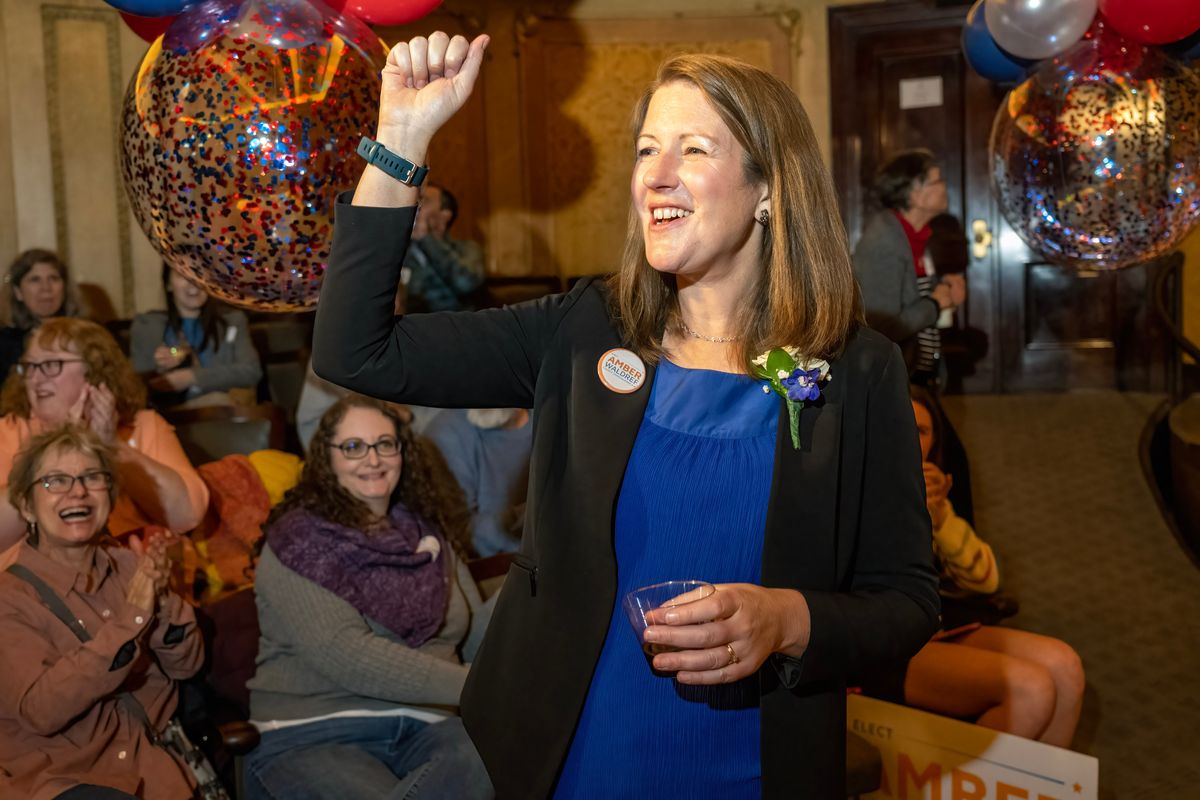Two Democrats heading to the Spokane County Commission, but Republican majority likely to hold
In a close race with Republican incumbent Al French, Maggie Yates, candidate for Spokane County Commissioner, speaks to the crowd during an election night gathering for Democratic and progressive candidates Tuesday at Riverside Place. (Colin Mulvany/The Spokesman-Review)Buy a print of this photo
Democrats won representation on the Spokane County Commission for the first time in a dozen years, but Republicans are in position to continue to control the body that writes county laws and determines spending.
On Tuesday night, Republicans won two commission seats, Democrats won two others and one race is too close to call.
In District 1, which covers west Spokane, Democrat Chris Jordan has 55% of the vote to Republican Kim Plese’s 44%.
Democrat Amber Waldref prevailed in District 2, the east Spokane district. The former Spokane city councilwoman won 56% of the vote, while Republican Michael Cathcart, a sitting city councilman, got 44%.
“The real work begins after the campaign to work on the key issues like community safety and housing that’s affordable for all,” Waldref said.
Two incumbent county commissioners had stress-free election nights.
In District 3, which covers northern Spokane County and half of Spokane Valley, Republican Josh Kerns had a dominant showing against an opponent who did little fundraising. Kerns will hold onto his seat, taking 77% of the vote compared to 21% for the party-less Wild Bill Schreiner.
Republican Mary Kuney cruised to re-election in District 4, which includes Spokane Valley’s other half, Liberty Lake and much of southeastern Spokane County. Kuney got 58% of the vote, while Republican pastor Paul Brian Noble received 41%.
Districts 2 and 4 will start with four-year terms. Districts 1, 3 and 5 will begin with two-year terms before switching to four-year terms in 2024.
The races for districts 1, 2, 3 and 4 went as predicted. None was expected to be especially close.
District 5, which covers the West Plains, northwest Spokane and the South Hill above 29th Avenue, had the potential to be a nail-biter and isn’t disappointing.
Republican incumbent Al French won 51% of the vote in Tuesday’s count, while Democrat Maggie Yates, who spent three years leading the county’s criminal justice reform efforts, had 49%.
It’s a narrow lead but, based on recent election results, French is in a good position to win. Later arriving ballots tend to skew conservative.
“We are up 2 points on election night and it just gets better and better from here,” French said. “We expect the lead to grow.”
Yates is still hopeful the numbers could turn around in her favor.
“We need to wait a little bit longer to get clarity,” Yates said. “We’re separated by less than 600 votes and it’s going to be a tight race.”
District 5 always promised to be interesting. It has outsized significance for two main reasons.
First, it’s the county’s lone swing district. District 5 voters have leaned Republican in recent elections, but the partisan split is only a few percentage points.
Second, whichever party won District 5 was likely to control the Spokane County Commission. Republicans were the heavy favorites in districts 3 and 4, and Democrats had the edge in the urban districts of 1 and 2.
The amount of money pouring into the race confirmed the high stakes.
French and Yates spent more than $300,000 combined on their campaigns, and third-parties invested more than $200,000. District 5 was one of the most costly races in history for county office , if not the costliest.
Regardless of which party ends up controlling the county’s most powerful office, the 2022 election has been a historic one for Spokane County.
Voters for the first time this November elected five county commissioners instead of three.
The change, mandated by a 2018 state law, has major ramifications for Spokane County government. Not only is the number of commissioners increasing, the commissioners’ responsibilities are morphing.
Every commissioner who takes office in January will represent just one district, not the county as a whole.
Bonnie Mager’s election in 2006 was the last time a Democrat won a seat on the commission.
The end of the countywide general election is what allowed Democrats to win a commission seat for the first time since 2006. The new structure could also lead to more contentious debates, since each commissioner will now be advocating for different constituents.
S-R reporter James Hanlon and correspondent Carly Dykes contributed to this story.






